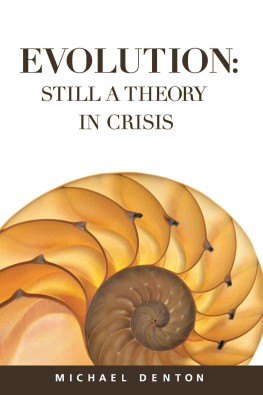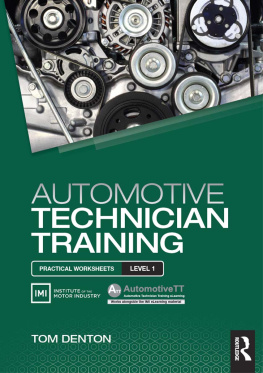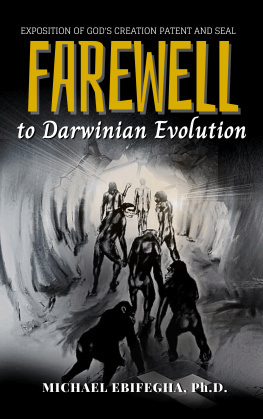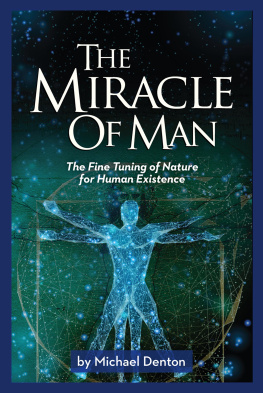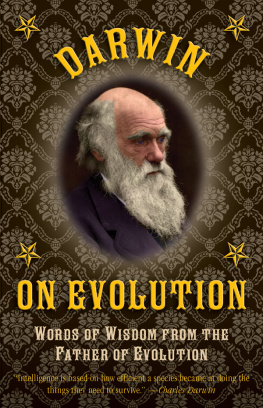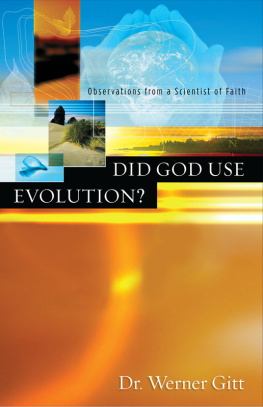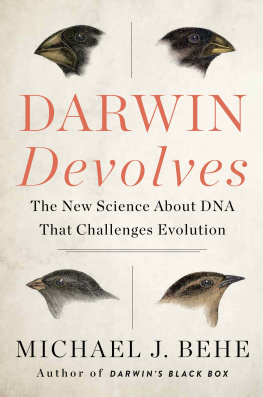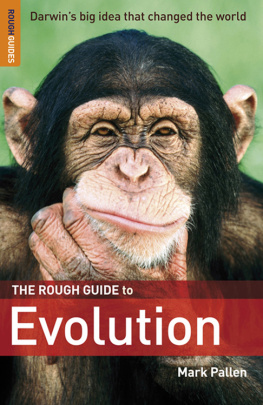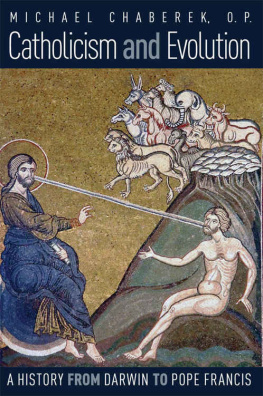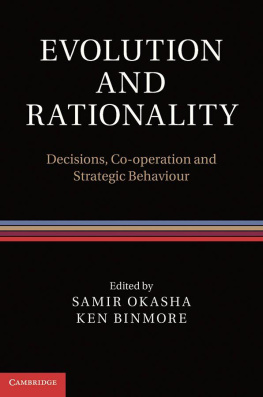Evolution
Still a Theory In Crisis
Evolution
Still a Theory in Crisis
MICHAEL DENTON
Seattle Discovery Institute Press 2016
Description
More than thirty years after his landmark book Evolution: A Theory in Crisis (1985), biologist Michael Denton revisits his earlier thesis about the inability of Darwinian evolution to explain the history of life. He argues that there remains an irresistible consilience of evidence for rejecting Darwinian cumulative selection as the major driving force of evolution. From the origin of life to the origin of human language, the great divisions in the natural order are still as profound as ever, and they are still unsupported by the series of adaptive transitional forms predicted by Darwin. In addition, Denton makes a provocative new argument about the pervasiveness of nonadaptive order throughout biology, order that cannot be explained by the Darwinian mechanism.
Copyright Notice
Copyright 2016 by Discovery Institute. All Rights Reserved.
Publishers Note
This book is part of a series published by the Center for Science & Culture at Discovery Institute in Seattle. Previous books include Signature of Controversy: Responses to Critics of Signature in the Cell and Debating Darwins Doubt , edited by David Klinghoffer; The Myth of Junk DNA by Jonathan Wells; and Alfred Russel Wallace: A Rediscovered Life by Michael Flannery.
Library Cataloging Data
Evolution: Still a Theory in Crisis
by Michael Denton
354 pages, 6 x 9 x 0.74 in. & 1 lb, 229 x 152 x 19 mm & 475 kg
Library of Congress Control Number: 2015960652
BISAC: SCI027000 SCIENCE / Life Sciences / Evolution
BISAC: SCI008000 SCIENCE / Life Sciences/ Biology
BISAC: SCI034000 SCIENCE / History
ISBN-13: 978-1-936599-32-5 (paperback), 978-1-936599-33-2 (Kindle), 978-1-936599-34-9 (EPUB)
Publisher Information
Discovery Institute Press, 208 Columbia Street, Seattle, WA 98101
Internet: http://www.discoveryinstitutepress.org/
Published in the United States of America on acid-free paper.
First Edition: January 2016.
Praise for Evolution: Still a Theory in Crisis
Of all the books that have been critical of Darwinian evolution in recent years, Michael Dentons Evolution: Still a Theory in Crisis stands out for doing more than simply compiling the full range of evidencefrom cosmology through all of biology to the origins of human languagethat goes against a blind, incrementalist view of the development of life. To be sure, Denton does that very well. But the books real triumph is to frame this criticism in terms of an alternative paradigm, one indebted to Darwins great rival Richard Owen. This proposed new paradigm is founded on the idea of discrete biological forms, or types, which have the standing of natural laws. Denton is consistently clear and scrupulous about how the evidence bears on neo-Darwinism vis--vis what might be called his neo-Owenism. All told, Evolution is the one book that I would recommend to any student or lay person who wants to think in positive, scientific terms out of Darwins black box.
Steve Fuller, Auguste Comte Professor of Social
Epistemology, University of Warwick, UK, and author
of Science vs. Religion? and Dissent over Descent
Darwinists often deflect trenchant criticisms by kicking the can down the road. In ten or twenty years science will surely show their theory is correct, they say. Now thirty years after his groundbreaking book, Evolution: A Theory in Crisis , Michael Denton calls their bluff. Not only hasnt Darwinism overcome its challenges, severe new problems have made the crisis much worse.
Michael Behe, PhD, Professor of Biological Sciences, Lehigh University, and author of Darwins Black Box and The Edge of Evolution
Based on a great variety of indisputable facts from biology and paleontology, Michael Denton presents in his new book a highly competent and very thoughtful critique of the neo-Darwinian paradigm. His arguments convincingly suggest that modern biology prematurely dispensed with the notions of typology, essentialism, structuralism, and laws of biological form as promising alternative approaches to the origin of biological complexity and diversity. His affirmation of common descent with modification also demonstrates that well-founded doubts concerning the capabilities of the neo-Darwinian mechanism cannot be easily dismissed as anti-evolution propaganda, but should rather be welcomed even by neo-Darwinists as heuristically fruitful.
Gnter Bechly, PhD, Paleontologist
In this book Michael Denton moves adroitly from the history of ideas to scientific explanation. Evolution: Still a Theory in Crisis is really two books in one: an insightful and fearless historical analysis on the one hand, and a provocative manifesto for a new biology on the other. It is a rare and powerful combination that demands careful reading.
Michael A. Flannery, Professor and Assistant Dean for Special
and Historical Collections, University of Alabama at Birmingham,
and author of Alfred Russel Wallace: A Rediscovered Life
Biologist Michael Denton has written a devastating critique of Darwinian evolution. Denton is not a creationist, but a structuralist. He makes a compelling argument, supported by abundant evidence, that the most basic structures of living thingstheir forms or body plansare not adaptive and cannot be explained by the cumulative selection that is at the core of evolutionary theory. Instead, he argues, those forms are part of the very fabric of nature. Everyone involved in the controversies over evolution should read this book.
Jonathan Wells, PhD, Biologist and Senior Fellow, Discovery Institute,
and author of Icons of Evolution and The Myth of Junk DNA
Michael Dentons new book Evolution: Still a Theory in Crisis is a substantial reworking of his classic book of (nearly) the same name. In this new book, he expands his argument against Darwinian adaptation as a mechanism capable of explaining the patterns we see in life. Using his considerable knowledge of historical and modern biology, he makes a fresh and compelling argument about the origins of animal form that will be completely new to many readers. I urge anyone interested in these questions to read this book.
Ann Gauger, PhD, Senior Research Scientist, Biologic
Institute, and co-author of Science and Human Origins
Learn More about the Work of Michael Denton
You can access more information about Michael
Denton, reviews of his new book, and a series of video
conversations with him at the books website.

www.TheoryinCrisis.com
The Companion Documentaries
You can watch two companion video documentaries on this topic.
Privileged Species
Privileged Species is a documentary featuring Michael
Denton that explores growing evidence from physics,
chemistry, biology, and related fields that our universe was
designed for large multi-cellular beings like ourselves.

www.PrivilegedSpecies.com
The Biology of the Baroque
The Biology of the Baroque is a documentary featuring Michael
Denton that explores the mystery of non-adaptive order in nature,
order that cannot be explained by Darwinian evolution.
www.BiologyoftheBaroque.com
Contents
1. Introduction
All in all, the empirical pattern of nature conforms remarkably well to the typological model. The basic typological axiomsthat classes are absolutely distinct, that classes possess unique diagnostic characters, that these diagnostic characteristics are present in fundamentally invariant form in all members of a classapply almost universally throughout the entire realm of life.
Next page
